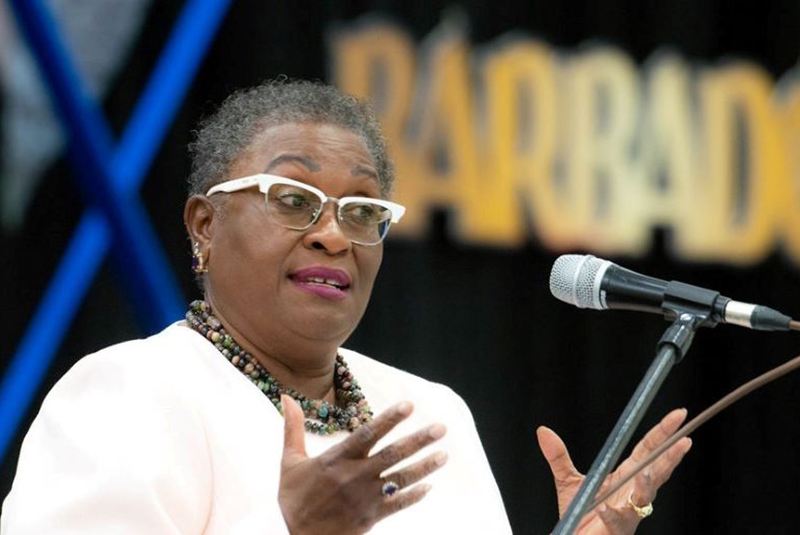BY SHEENA FORDE-CRAIGG | JUN 27, 2022
Barbados’ Ambassador Extraordinary and Plenipotentiary for Climate Change, Law of the Sea, and SIDS, Elizabeth Thompson, speaking at the BTMI’s second Visit Barbados Stakeholder Forum, at the Lloyd Erskine Sandiford Centre, today. (T. Barker/BGIS)
The impact of external shocks on tourism, such as climate change and COVID-19, is visible, and now is the time to create a sustainable and resilient destination that is beneficial to both locals and visitors.
Barbados’ Ambassador Extraordinary and Plenipotentiary for Climate Change, Law of the Sea, and Small Island Developing States, Elizabeth Thompson, emphasised this, as she spoke at the Barbados Tourism Marketing Inc.’s (BTMI), second Visit Barbados Stakeholder Forum, held at the Lloyd Erskine Sandiford Centre, this morning.
Speaking on the topic “Taking Tourism Forward Toward Sustainability and Climate Resilience”, Ambassador Thompson pointed out that according to the Seminal Outcome of the United Nations Rio Conference on Sustainable Development 1992, sustainability is identified by three pillars – society, economy and environment.
And it is against those pillars, she stated, that tourism must assess its vulnerability or viability in the face of exogenous or external shocks and develop a sustainable tourism product.
She noted that research from multilateral development banks shows that Caribbean countries are located in the second most tourism-dependent region of the world, and along with Latin America, in the world’s second most disaster-prone region, and it is therefore imperative that Barbados builds its resilience.
“Resilience is essentially toughness. It is the capacity to face adversity; reduce its impacts, and recover from them well and in the shortest possible time,” Ms. Thompson said.
The Ambassador declared that in order to build sustainability and resilience in the tourism sector “expeditious and in-depth study” must be undertaken by tourism authorities.
“By virtue of our vulnerabilities, small island developing states, such as Barbados, have exhausted the luxury of time to undertake lengthy, philosophical contemplations of what remedial or adaptive actions can be taken to counter climate impacts….”, she stated.
She added that Barbados and CARICOM were too far behind in dealing with the phenomenon that is climate change and its effects, which is “quite literally a matter of lives and livelihoods for us”.
Ambassador Thompson shared some information on how Barbados could build a resilient tourism product. This included protecting the coastlines and coral reefs; balancing the planning and growth projected in the tourism sector against our capacity to provide space, transport, water, food, and other natural resources to meet the needs and demands of that growth; guarding against over tourism, which raises the issue of constant growth as the imperative and principal driver on which our approach to tourism policy are based; and rebuilding or reinforcing pre-existing tourism infrastructure.
Also speaking at the forum were other experts in tourism and sustainable development, including CEO of Travel Foundation, Jeremy Sampson; Managing Director of the STAMP Program in the Centre for Sustainable Global Enterprise at Cornell University, Dr. Megan Epler-Wood; CEO of Sustainable Travel International (STI), Paloma Zapata, and BTMI’s CEO, Dr. Jens Thraenhart.
Tomorrow, Tuesday, June 28, and Wednesday, June 29, BTMI and STI will host two special climate action workshops and shine a light on the roadmap to net zero.
These workshops will aim to accelerate the decarbonisation of the island’s tourism operations by engaging a wide cross-section of the tourism sector in carbon removal; all to ensure that Barbados’ tourism development would be sustainably driven.
Registration for the workshops is open to the public and anyone interested in attending should visit mindfultravel@visitbarbados.org.




